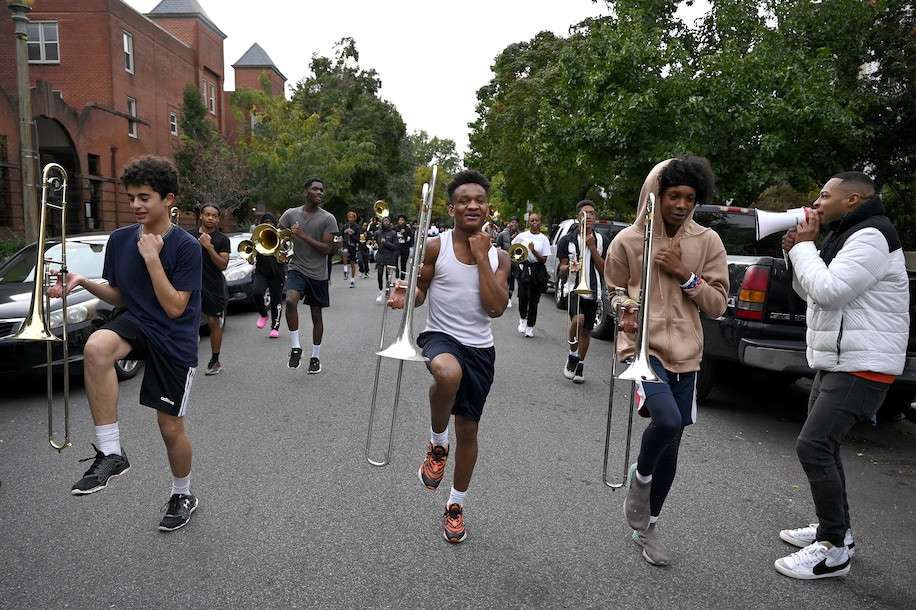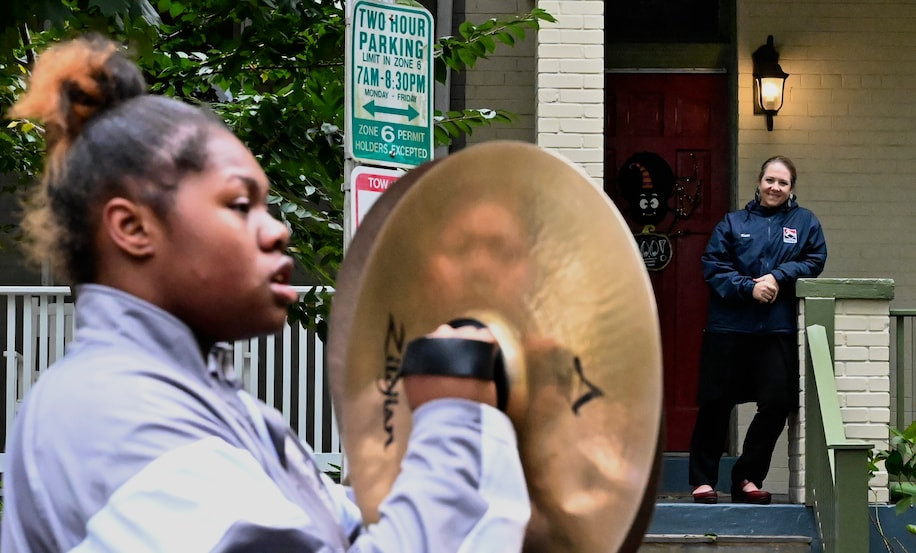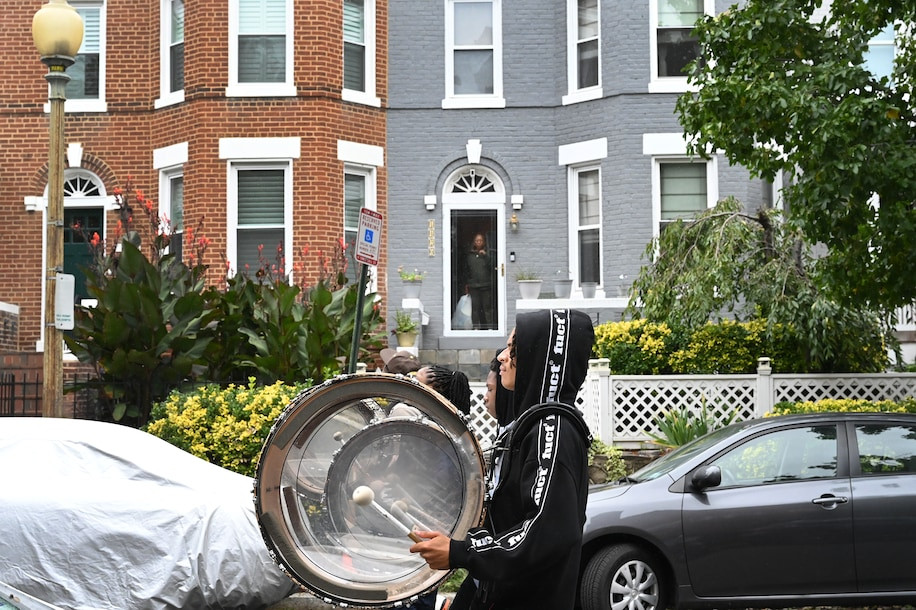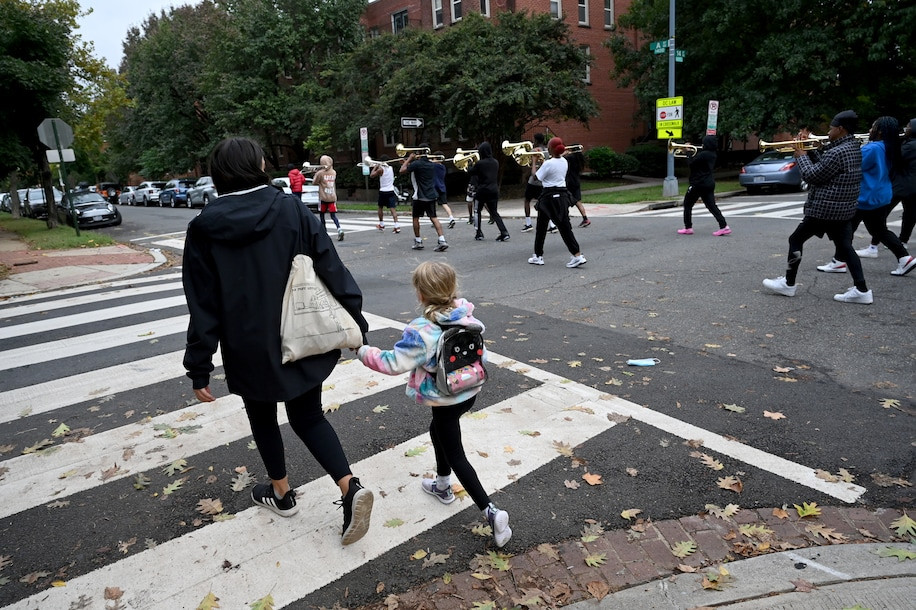
OVERVIEW
MANAGEMENT
PERFORMANCE
POSSIBILITIES
CAPITALS
ACTIVITIES
ACTORS
BURGESS
|
EDUCATION
THE MARCHING BAND A broke marching band parades on Capitol Hill to practice. Magic ensues. ... The mostly low-income kids in the Eastern High School Marching Band are beloved by the mostly affluent D.C. homeowners who witness their practices 
Original article: https://www.washingtonpost.com/dc-md-va/2022/10/08/eastern-marching-band-capitol-hill-dc/ Peter Burgess COMMENTARY This is a great article. It is an important reminder of the amazing value that comes from an educational ecosystem that works. I learned at an early age that book study was an important part of education, but it was not all of education which needed to include a range of activities and socialization. I was fortunate. I was growing up in England. My father was a schoolmaster with strong views of what a good education should be like. For the first half of his career he was a teacher at a 'good school' and in addition to academic teaching he ran the school's rugby and cricket programs. For the second half of his career he was the Headmaster of a Secondatu Modern School ... that is a school for the students that had 'failed' the 11+ examination. His decision to do this was based on the idea that 'good' students were easy to teach and they learned easily from the books, but the weaker students were much more of a challenge, and they need good schools and good teachers way more than the 'brainy' students. In England, we did not have 'Marching Bands' but we did have sports ... for boys, rugby or soccer teams in the winter and cricket teams in the summer, as well as track and field athletics ... for girls, hockey, netball and tennis. My father used sports as a key part of teaching, and especially the building of character and confidence. In my father's school, there were a range of 'activities' as well like carpentry for boys and domestic science (cooking) for girls. In the 'good' school where I went our curriculum included the sciences: physica, chemistry and biology. At my father's school ... we were in a rural area where farming was a major activity ... the curriculum inlcuded 'gardening. By the time the students had done their 'gardening' courses they knew more phyusica, chemistry and biology thanks to 'gardening' than the most of the 'good' school students had learned from their books. My father also made of point of giving support to sports ... good training and then being serious about the school teams. I played rugby and cricket at the 'good' school. When out 'good' school teams played my father's 'bad' school teams it was pretty intense ... and especially so when the son of the headmaster of the 'bad' school was on the opposing team. I remember playing on the rugby team when I was about 12 years old ... and the target it seemed for everyone on the other side. Good experience for the real world that would come soon enough. I remember ending the game with a huge gash around my mouth where my teeth had pushed through from the inside ... lots of blood, but no missing teeth. It was the weekend, so the local hosipital was closed until Monday, and when I went I was told that I should have had stitches, but it was too late. The good news is that stitches would probably have left an unsightly scar, while letting nature take its course and there was no visible scar. Fast forward 70+ years, and in this article I see and hear many important elements of a good education. When I first came to work in the USA in the 1960s, I was fascinated by High School Marching Bands and the pride schools and students had in these activities. Bravo. Peter Burgess | ||
|
A broke marching band parades on Capitol Hill to practice. Magic ensues.
The mostly low-income kids in the Eastern High School Marching Band are beloved by the mostly affluent D.C. homeowners who witness their practices Written by Lizzie Johnson ... Lizzie Johnson is an enterprise reporter at The Washington Post and the author of 'Paradise: One Town's Struggle to Survive an American Wildfire.' October 8, 2022 at 7:00 a.m. EDT Eastern High School band director James Perry, right, gives direction to the students as they march through Capitol Hill neighborhood to prepare for homecoming and the 100th anniversary of the school. Eastern High School band director James Perry, right, gives direction to the students as they march through Capitol Hill neighborhood to prepare for homecoming and the 100th anniversary of the school. (Katherine Frey/The Washington Post) Rush hour traffic slammed to a halt as the high school band director walked backward into the busy Capitol Hill intersection, followed by a line of teens gripping trombones, trumpets, french horns and flutes. The thunk-thunk-thunk of bass drums reverberated in the damp October air. “Straight ahead, band, you got to be lookin’ straight ahead,” James Perry, director of the Eastern High School Marching Band, shouted at the students through his megaphone. “Hey, hey, hey, hey!” they chanted back. Eastern High’s homecoming and a celebration of the school’s 100th anniversary were just days away, and the 65-member band — known as “The Blue and White Marching Machine” — was practicing for a performance Saturday that would draw hundreds of Eastern students, parents and alumni. Now, they followed a familiar path, down A Street NE toward Lincoln Park, delighting neighbors and anyone else who stumbled upon them. Practically everyone pulled out their cellphone to record the band as it passed. With four students across, they took up the entire road. 
Eastern High School marching band practiced their performance ahead of their homecoming in Capitol Hill on Oct. 6. (Video: Lizzie Johnson/The Washington Post) People cheered and shouted encouragement from their front stoops, car windows and the small tables set up outside the local coffee shop, Wine & Butter. Children chased the teens down the block. Sometimes passing patrol cars would flick on their lights and block oncoming traffic so the students could safely pass. Only the dogs weren’t fans. They lunged at the ends of their leashes or cowered behind their owners, uncertain. But Perry, 41, who also works as an attendance counselor at Eastern, didn’t take it personally. He chalked it up to the drums. As the students high-stepped down the street, over wet leaves and under a sky of sagging rain clouds, the driver of a black Toyota Camry rolled down his window and peered out. A woman smoking a cigarette, blue handbag slung over one shoulder, stopped on the sidewalk, gawking. “Hey band?” Perry shouted. “What?” “Hey band?” “E-H-S!” they yelled. They passed million-dollar rowhouses decorated for Halloween, with pumpkins heaped on porch steps and ghosts of stiff gauze frozen on lawns. A toddler pressed against the front door of one home, his breath fogging the glass. Nearby, Katie Telligman, 42, put on a warm jacket and stepped outside her home to better hear the music. “This has been one of the greatest things we’ve discovered since moving to this street five years ago,” said Telligman, who works in communications and has lived on Capitol Hill since 2002. For a while, the pandemic had disrupted these impromptu parades. Now the neighborhood valued them even more. “We’ve watched some of the kids grow up,” Telligman said. “It’s so unique and brings joy to people’s lives. They don’t put this on the real estate listings for the street, but they should. Where else in D.C. can you find this?” 
Katie Telligman watches the Eastern High School band perform in the street on Oct. 4 in Washington. (Katherine Frey/The Washington Post) ‘The Pride of Capitol Hill’ In Room W01, Perry aimed to give his students something they couldn’t always find elsewhere at Eastern High — a place to dream. Eastern’s 735 students, nearly all Black and most from poor families, face obstacles the affluent residents surrounding the school rarely do. Eastern has long struggled with low test scores, high absenteeism and constant teacher burnout. She and her twin were inseparable. Then a gunman tore the 15-year-olds apart. But in the band room, the teens felt like they had a chance to aspire for more. “The main thing is family and new opportunities,” explained Marckelle Hodge, 17, a senior trombonist. “It’s more than I would’ve had in other programs. I want to get good grades, go to college, and make it out of my neighborhood. I’m thinking Texas Southern.” Perry, who played alto saxophone in Norfolk State University’s band, knows that such a thing is possible. Recent graduates of Eastern’s program have received full-ride scholarships to Columbia, Florida A&M, Mississippi State and other universities — places he tries to take the students for band competitions to show them what’s possible. What isn’t covered by a student’s scholarship is augmented by care packages from their musical alma mater. The boxes from the band arrive stuffed with laundry detergent, socks and underwear, towels, deodorant and other college kid essentials. Many of Perry’s students “come from tough backgrounds and deal with a lot at home,” he said. For 15 years, he’s directed the program, which includes younger students from nearby middle schools that lack music programs. Perry raises money for the band program by charging booking fees for their performances in the community. It costs $750 — plus transportation — for an appearance from the drum line. The entire band costs $1,500. It takes about two performances to pay for a competition, he said, usually in the Washington region but sometimes as far away as Atlanta. The buses are the most expensive part. In 2019, Perry said he donated his own money to the band by selling his car so the teens could travel and afford new warm-up uniforms. He now walks to work, he said. The Capitol Hill Community Foundation also gave the band a $20,000 grant to repair and replace instruments and announced plans to raise $90,000 more. The band kids have always been scrappy. They used to play at Metro stations to raise money. They washed their threadbare uniforms at the laundromat because they couldn’t afford dry-cleaning, hand mending them as needed. But the band’s motto — “The Pride of Capitol Hill” — has proved true time after time. 
People watch from their doors as the Eastern High School band marches down A Street NE on Capitol Hill. (Katherine Frey/The Washington Post) ‘Do we give up?’ The community, Perry said, “has really just adopted them.” In 2008, when the band needed $3,000 for the bus ride to a performance in Ohio, neighbors raised the money. And in 2015, when the band needed another $4,000 to get to Virginia, the community stepped up again. The students practice three times a day, before, during and after school, usually finishing at 7 p.m. Perry often reminds them that their reputation as “the city’s premier band” means everything. The band room reflects their success. The piano and lockers are topped with colorful trophies and other awards. They’ve performed in four NFL halftime shows, three presidential inauguration parades and the opening ceremony for the FIFA World Cup Games. When The Washington Post moved out of its old building in Northwest D.C., Eastern’s band marched through the newsroom. Anything but excellence, Perry tells the kids, is “bad for the brand.” When students talk over each other or fail to listen, he makes them do push-ups, calling it “character building.” He doesn’t tolerate misbehavior. “It’s Homecoming week!” Perry yelled into his megaphone Tuesday afternoon as they started practice. The students were clustered on the football field — hoods cinched around their faces to wield off the rain — preparing for their foray around Capitol Hill. “The performance is on Saturday, y'all,” he continued. “Do we give up? Or do we maintain our energy? Y’all understand?” “Yes sir!” they shouted back. Davon Richardson, a 15-year-old sophomore who plays the trumpet, peppered Perry with questions, eager to get going. He was in a thin shirt, despite the 53-degree weather, and jumped from foot to foot to stay warm. He liked parading through the neighborhood, he said. The residential streets they marched down reflected a different reality than their school — the homeowners were predominantly White — but the students loved it. “People cheering out their houses and listening to and enjoying us,” Richardson said. “I like hearing them yell.” “Yeah, it feels like I’m making people’s day,” added Tobias Johnson, 16, a junior who also plays the trumpet. “I see them smile, and it makes me so happy.” Their instruments might be old and their uniforms worn. Their section might be short two trumpets. But they knew they had an unparalleled capacity to spark joy. 
Families march along with the Eastern High School band as they practice for homecoming. (Katherine Frey/The Washington Post) ‘Go band!' The strains of “Just Got Paid” by Johnny Kemp thundered down the street. It was one of the band’s favorites, along with “I Would Die 4 U” by Prince. The teens continued high-stepping — all knobby knees and twirling drumsticks — as they ventured deeper into the neighborhood. In house after house, heads popped out front doors. The music was the only lure that could prompt them outside on a drizzling afternoon. “Go band, go band!” yelled Adrianne Marsh, 44, a political consultant, who bobbed and swayed to the beat with her two young daughters. On the sidewalk, a blond girl in a school backpack shimmied her shoulders. Her younger brother leaned back in their mother’s arms to see better. Just then, two girls in pink shoes darted past them, hand-in-hand, chasing after the band. One of them was Bahman Koosha’s 6-year-old daughter, Nikki Koosha, who said her favorite instrument is the drum because it makes her “feel happy.” “I like that the band is noisy,” she said. “Almost every other day, we come and watch,” said Koosha, 41, an engineer. “As soon as the kids hear them, we have to go out,” agreed Filip Medic, 42, a director at a nonprofit. He paused, watching as his 3-year-old, Tessa Medic, took off running again with Nikki. At the end of the block, the band paused. Perry blew into his whistle. The teens quieted, and he gave a few pointers over the megaphone. “My fingers are freezing,” a flutist whispered to her classmate. “They’re going to fall off.” A few moments later, they turned and resumed marching. The trombonists went first, dancing as they stepped, followed by the rest of the band, in a cymbals-clashing, drumbeating, sousaphone-blaring ruckus. “Eastern!” they shouted. In their wake, the music slowly faded and the neighborhood was quiet again. By Lizzie Johnson ... Lizzie Johnson is an enterprise reporter at The Washington Post and the author of 'Paradise: One Town's Struggle to Survive an American Wildfire.'
| The text being discussed is available at | https://www.washingtonpost.com/dc-md-va/2022/10/08/eastern-marching-band-capitol-hill-dc/ and |